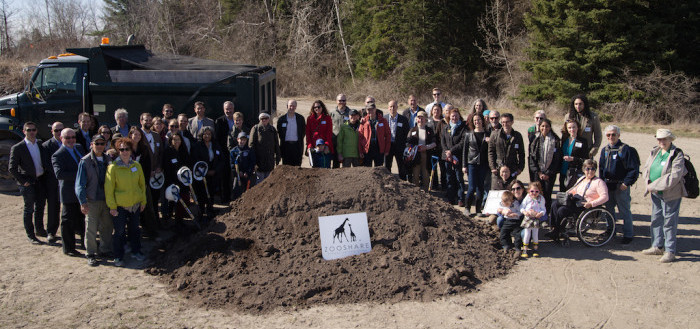TREC’s recently published report, The Power of Community explores the economic, environmental, and social benefits of locally owned and operated renewable energy initiatives. In general, community owned renewables lead to higher job creation; stronger economic impacts and better social license to develop projects compared to commercially developed projects. Since the creation of the Feed-in Tariff program under Ontario’s Green Energy and Green Economy Act, community participation in renewable energy has increased dramatically. This week, we’re profiling a few co-operatives leading the way in establishing locally-owned renewables in Ontario.
ZooShare Biogas Co-operative
Zooshare is developing North America’s first zoo-based biogas plant near the Toronto Zoo. The biogas plant will recycle manure (“zoo poo”) and local grocery store waste into renewable power for the Ontario grid. How does “waste” become energy? As the manure and food waste decompose, methane is released and is used to run a generator. This process reduces greenhouse gas emissions by the equivalent of 10,000 tonnes of C02 each year and creates a by-product of nutrient-rich fertilizer (which would otherwise be destined for a landfill). It’s a win-win for everyone, especially the 600+ members of this community-power project who have purchased $3 million worth of ZooShare bonds. The project is expected to be up and running by early 2017.
Below is an interview with Frances Darwin, Sales & Marketing Manager at ZooShare:
Why are your members interested in becoming ZooShare investors?
Environmental welfare combined with an appealing return on investment makes ZooShare an ideal opportunity for environmentally conscious investors.
“ZooShare was a perfect way to get involved, we really love the idea of making use of waste products. Our society needs to manage our waste better, what better way than making clean electricity from it?” –Don Ross, ZooShare member
How does ZooShare’s project benefit your surrounding community?
Our project empowers members of the community to “put their money where their mouth is” by supporting local renewable energy production. By investing in ZooShare, members are keeping energy dollars in the local economy, helping to reduce greenhouse gas emissions in their community, and ensuring that valuable nutrients aren’t going to waste in a landfill. While the investment commitment is only 5 years, the impact of this project will go on for another 15-20 years, ensuring a cleaner environment for the next generation.
What kind of challenges did ZooShare face?
Our biggest challenge has been figuring out a way to ensure we receive “clean” organics. Although we would love to accept green bin waste, most people aren’t the best at sorting, and plastics or metal would be a challenge for any biogas plant. As technology and policy (such as banning organic waste in landfills) move forward, these challenges will be less of an issue for the next biogas entrepreneurs.
Why does Community Power matter?
Community power gives people an opportunity to get directly involved with local renewable energy production: You learn more about where power comes from, how it’s made, and the people who create and use it. And by coming together en-masse, you’re helping to create local innovation that would otherwise be quashed by the status quo
Learn more at zooshare.ca

